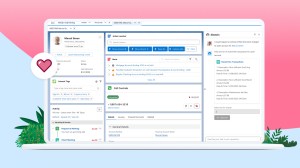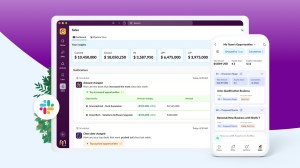Editor’s Note: This excerpt from Salesforce Futures Magazine explores the diverse applications of personal AI agents. It also reveals why digital companions aren’t just technological marvels helping with basic tasks — they are becoming essential tools in addressing some of humanity’s most pressing challenges.
The transformative promise of personal AI agents — artificial intelligence systems designed to assist people with everyday tasks like scheduling a doctor’s appointment, writing an email, or recommending a book — lies in their ability to compensate for human limitations. Anyone who’s struggled to finish one task during a busy day, let alone juggle many of them, can understand why this would be useful.
Infinite interns + patience
Imagine an army of infinitely patient interns who stand ready to work on your behalf. These interns can either collaborate alongside you in the flow of work, or they can labor independently, periodically checking in to ensure they’re on the right track. The more they work with you, the smarter they get, learning how you work and think across modes and contexts. Think about a world where all of us have the kind of expert staff currently enjoyed by CEOs: gifted helpers who learn our preferences, understand our goals, engineer outcomes, and specialize in doing all of the things we don’t want to do.
Tech blogger and consultant Venkatesh Rao encourages us to think about machine intelligence as fundamentally different from human intelligence, particularly when it comes to “attention.” Our personal agents will have endless patience for tedious, detailed tasks (think taxes, paperwork, applications, and more) that sap our attention and, occasionally, our desire to endure the human condition. Agents have the potential to remove this burden.
Personalization
Greater contextual intelligence and more persistent memory suggest agents will provide personalization that’s far greater than what we see today. Itai Asseo and Phil Mui, who work on AI research and development for Salesforce, encourage us to think about personalization in three categories: “know me,” “inform me,” and “empower me.”
Meet Einstein Copilot, a new customizable, conversational, and generative AI assistant for CRM.
Einstein Copilot can answer questions, summarize content, create new content, interpret complex conversations, and dynamically automate tasks on behalf of a user, all from a single, consistent user experience embedded directly within Salesforce’s #1 AI CRM applications.
In the “know me” category, agents keep your goals in mind, analyze your performance, and adjust to your unique style. Because every interaction with personal AI will be remembered — or stored as a state — and factored into future use cases, a flywheel effect takes hold: the more you use your agent, the better it gets at anticipating your needs in an intuitive way.
In the “inform me” category, we consider the possibility that agents could use their contextual intelligence to help guide and prioritize our attention and separate signals from noise. This has clear applications in the personal productivity space, but the implications on the consumer side are no less significant. Imagine an agent who helps you switch on “Zen Mode” and other filters so you can better tune your environment, and even remove things from your plate by acting on your behalf.
Finally, the “empower me” function, which speaks to personal AI’s ability to serve as a coach/mentor, or even a manager.
If personal AI can deliver such control, it will forever change the relationship between customers and companies by raising the bar for direct relational engagement.
Natural interactions
Recent demos by startups Humane and Rabbit have started to tangibly articulate what agent-based offerings might look like.
Common early use cases include ordering food, finding gifts for loved ones, planning trips and events, and scheduling appointments. What these demos hint at is a more fluid and flexible collaboration between humans and machines, especially when it comes to attention. Both offerings promise less tapping and scrolling and more focus.
Both products also rely on conversational interfaces to do this, but we think voice will be only one of the ways people interact with their agents. Many proto-agents feature travel in their demos, but solving a multi-part travel puzzle that includes schedules, price comparisons, and airline and hotel preferences using only voice commands is less than ideal. Liz Trudeau of Salesforce Design encourages us to think about a more practical alternative. “Think about a collaborative interaction, a flexible interface that adapts to the task at hand and the job the user is trying to accomplish,” she said.
Think about a collaborative interaction, a flexible interface that adapts to the task at hand and the job the user is trying to accomplish.
Liz Trudeau, Salesforce Design
We like this concept, “UI on the fly,” because it emphasizes a truly responsive interface that adjusts accordingly as needs change. You can get a glimpse of what this multi-modal future might feel like in the much-discussed Google Gemini demo depicting the planning of a birthday party.
In aggregate, these developments point to futures where tools are easier to use and it’s easier than ever to get things done.
Advanced skills and learning
In 2014, when Amazon launched its original Echo, the device was little more than a bluetooth speaker. Adding the Alexa assistant promised to turn the Echo into something else entirely: a conversational smart home hub, particularly as the Alexa Voice Service SDK toolset expanded the library of skills available to consumers. Alas, most Echos are still used mainly as speakers and the skills revolution has not happened. Nevertheless, the concept of a core agent and a library of additional skills offers a preview of what we might see in an agentive world, hopefully with results far more impressive than Alexa 1.0.
The ability to train agents on data sets (including proprietary ones) means people can far more easily create useful personal AI tools for others based on specialized knowledge. This, in turn, empowers people to build more agents. Already, we can see Open AI allowing users to rapidly build their own GPTs, enhanced with advanced skills based on additional “instructions, extra knowledge, and any combination of skills.”
These advancements suggest a forthcoming Cambrian explosion of agent skills and capabilities, personalized for an infinite variety of tasks. We know this would transform how companies interact with customers. What we don’t know is which sectors will be transformed first.
Unmet needs
A key element of Clayton Christensen’s theory of disruptive innovations is that early disruption will come from offerings that target the unmet needs of customers at the bottom of the market, hitherto uneconomical to serve. Often, these offerings appear inadequate to the mainstream of the already served, but they can grow and improve from tiny seeds. Looking at the emerging agent landscape, we can see an example of this dynamic in the wave of AI companions, such as those provided by Replika, character.ai, and Baidu’s Wantalk.
These companions, chatbots, and avatars serve the needs of the lonely, the elderly, and those who cannot afford costly therapy. While companions can generate an “ick factor” response among mainstream audiences, observers such as Andreesen Horowitz have identified how the “companion stack” may hold clues as to the future directions of the larger agent space.
For example, we may see agents that super-empower individuals, catalyzing a new wave of entrepreneurship in developing countries by serving needs that could never have been met before, and thereby generating a similar impact to that of mobile phones a generation ago.
Conclusion
The evolution of agents will be determined by consumer preferences and progress against technical challenges, but market dynamics and the way businesses and consumers balance trade-offs will play an equal role. In other sections of Futures, the new magazine from Salesforce Futures, we look at how agents work, whether or not agents represent a viable new business category, and some possible and plausible AI futures and their implications.
For a deeper dive into the world of personal AI, check out the magazine here.















